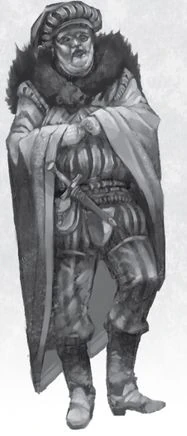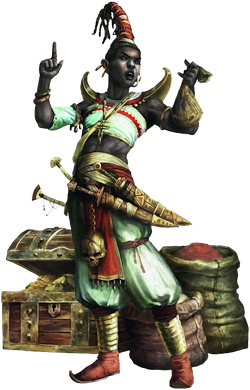"How did I become a millionaire? Well, when I was a girl with only a pfennig to my name, I went to the local farmer and bought an apple. Then I walked to the market and sold the apple for two pfennigs. The next day I bought two apples from the farmer and walked to the market again and sold the apples for four pfennigs. And so it went on, every day; I walked to the farm, bought some apples, and then walked to the market to sell them at a profit. And by the time I was twenty-five years old, my grandfather died and left me a million crowns."
- —Johanna Sainzburg, Fresh Fruit Magnate[3a]

An Old Worlder merchant
A merchant is a person who trades in commodities produced by other people, especially one who trades with foreign countries. A merchant is usually the owner of a transportation business who arranges to move by land or sea large amounts of goods, produce and commodities from city to city and nation to nation, seeking to buy goods at a low price in one market and sell them for a profit in another.[1a]
Much of their time is spent identifying the market in which they will make the most handsome profit based on the goods available to them. The growth in commerce and trade which has driven the development of a "middle class" of burghers in the Empire, Tilea and Kislev in recent centuries is largely the result of the work of merchants.[1a]
Merchants seldom interact with the populace as they deal in bulk, generally selling their goods to burghers and tradesmen. Merchant guilds are extremely influential in the Empire and they are slowly usurping the dominant socioeconomic position once held by landed nobles in the Old World. Even the poorest merchant tends to be very wealthy -- indeed, many use their wealth to buy political legitimacy and status, purchasing noble titles of their own or marrying their children into noble families -- in return for a very large dowry.[1a]
Most merchants deal in simple goods -- alcohol, fabric, craft goods, strategic raw materials, pottery. More ambitious merchants can make their fortunes selling exotic goods such as gromril or exotic spices from the Far East. However, these goods require long treks over dangerous trade routes and good foreign contacts to reach the market towns of the Empire and the Old World.[3a]
Beyond the Empire[]

An Arabyan merchant
Though the Empire's merchants compete with their Kislevite, Bretonnian, and Tilean counterparts, they do so good-naturedly. They don't see their neighbours so much as threats as they do rivals. On the other hand, traders from Araby are in direct competition and have access to all manner of goods, dealing directly with Ind and Grand Cathay, which allows them to corner the market on spices, silk, and other finished goods from the Far East.[4a]
The Empire's biggest mercantile rivals are the city-states of Tilea, whose marketplaces swell with the influx of strange imports and stranger foreigners. Legendary for their shrewd bargaining skills, Tilean merchants are second only to the Arabyan dealers, whose negotiations are legendary.[4a]
Other Races[]
The Empire, Tilea, Estalia and Bretonnia are all eager customers for Dwarf goods and Tilean merchants frequently act as intermediaries, ensuring that some exchange still goes on between the High Elves and Dwarfs despite both sides' continued antipathy towards each other.[5a] Compared to the karaks of the Worlds Edge Mountains, Karak Hirn is less wealthy and powerful, yet they are closer and more accessible to the markets of the Empire and Tilea and act as trading centres for Dwarf goods brought from further east.[5b]
The Dwarf holds in the Grey Mountains have traded with Men in the River Reik Basin since even before the advent of the ancient Unberogens in the region that would become the Empire. Trade with the city of Altdorf is particularly lucrative, although Dwarf merchants find their Human compatriots irritatingly impatient negotiators. Conditions have worsened in recent centuries, a situation which the Dwarfs blame on the elgi-influenced Colleges of Magic. These days most Dwarf traders head directly to Altdorf's Dwarf Quarter, where Imperial Dwarf middlemen purchase their goods for resale in the rest of the city.[6a]
A Day in the Life[]
"Those bolts of exotic Cathay silks? Pfft. Who'd want those? I'll give you fifty gold crowns for the entire cartload because I feel sorry for you. I'm doing you a favour."
- —Anonymous merchant[2a]
To be a merchant is to know the value of a gold coin and a silver tongue. They know what flows in and out of the gates of a city better than any soldier or guard. They know how to speak eloquently with nobility, and conduct the most vulgar of conversations with criminals. The gift of words is a merchant's most valuable asset.[2a]
Those starting out in the career of the merchant are traders, who bring shipments of needed goods from rural villages to local market towns.[3a] For traders, much time is spent travelling. A good merchant knows the path that goods must make from beginning to end, and a very good merchant knows all the people along that path. Traders spend much time meeting people, and getting to know who may prove to be allies or hindrances later in their careers.[2a]
As time goes on and the trader's coffers begin to fill with gold, they may join a merchants' guild and become the junior business partner to a master merchant.[3a] During this period, less time is spent on travel, and more is spent in the city. Such time, however, is not idle. With the knowledge gained in travelling, merchants learn to better negotiate with ships' captains and caravan leaders for favourable transportation costs, and with various craftsmen guilds for the numerous goods and services that they need.[2a]
The most powerful master merchants are known as merchant princes. These individuals may have operations in multiple cities and nations, including warehouses and sales offices. Many merchant princes branch out into banking, moneylending, and investing in land as well as new commercial and artisanal businesses.[3a]
A merchant's evening is usually spent in the company of others, preferably of those with political influence. For the merchant, this is as much about appearances as it is the opportunity to make allies. Lowly merchants seen sipping wine with a powerful countess may find themselves shortly doing business with genteel clients, even if they never speak a word to the noblewoman. Likewise, a few rolls of the dice with a notorious criminal in a gambling hall may lessen the number of bandit attacks on a merchant's caravan routes... particularly if the merchant is a gracious loser.[2a]
The life of a merchant is one of constant motion. If merchants are not busy working on a venture, then they are certainly planning the next one, or at least laying the groundwork for a new opportunity.[2a]
Affiliations[]
"After sixty years in the trade, here are the three most important lessons I've learned. One: friendship means nothing. Two: without ambition you're nothing. Three: no matter how fruitless the prospect, you can always squeeze more blood from a stone."
- —Ubel Rikard-Goellner, Merchant Prince of the Empire[3b]
Most towns and cities of the Empire have merchants' guilds, to which most credible merchants belong if they wish to be successful. The size and scope of such guilds is dependent on the size of the town in which they reside.[3a]
A small town might only have a single guild encompassing all sorts of trade, while a large city might have several guilds dealing with more specific goods, such as foods, cloth, or precious gemstones.[2a] In recent years, the power of the merchants' guilds of the Old World has begun to rival that of the more powerful noble households.[3a]
More savvy merchants also are in good standing with related guilds, such as the shipmaster's guild or even the thieves' guild. The extent of this relationship with other guilds ranges from actual membership, to some casual friendships and a few well-placed gold coins.[2a]
Sources[]
- 1: Warhammer Fantasy Roleplay 2nd Edition: Core Rulebook (RPG)
- 1a: pg. 77
- 2: Warhammer Fantasy Roleplay 2nd Edition: Career Compendium (RPG)
- 2a: pg. 143
- 3: Warhammer Fantasy Roleplay 4th Edition: Core Rulebook (RPG)
- 4: Warhammer Fantasy Roleplay 2nd Edition: Old World Armoury (RPG)
- 4a: pg. 13
- 5: Warhammer Armies: Dwarfs (5th Edition)
- 6: Warhammer Fantasy Roleplay 4th Edition: Altdorf - Crown of the Empire (RPG)
- 6a: pg. 188
